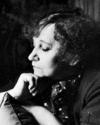- Colette
-
/koh let", keuh-, ko-/; Fr. /kaw let"/, n.1. (Sidonie Gabrielle Claudine Colette) 1873-1954, French author.2. a female given name.
* * *
in full Sidonie-Gabrielle Coletteborn Jan. 28, 1873, Saint-Sauveur-en-Puisaye, Francedied Aug. 3, 1954, ParisFrench writer.Her first four Claudine novels (1900–03), the reminiscences of a libertine ingenue, were published by her first husband, an important critic, under his pen name, Willy. After separating from him, she worked as a music-hall performer, a life she fictionalized in The Vagabond (1910). Among her mature works are Chéri (1920), My Mother's House (1922), The Ripening Seed (1923), The Last of Chéri (1926), Sido (1930), and Gigi (1944; musical film, 1958), a comedy about a girl reared to be a courtesan. Her novels of the pleasures and pains of love are remarkable for their exact evocation of sounds, smells, tastes, textures, and colours. In her highly eventful life, she freely flouted convention and repeatedly scandalized the French public, but by her late years she had become a national icon. Colette, 1937.Charles Leirens/Black Star
Colette, 1937.Charles Leirens/Black Star* * *
▪ French writerin full Sidonie-Gabrielle Coletteborn Jan. 28, 1873, Saint-Sauveur-en-Puisaye, Francedied Aug. 3, 1954, Parisoutstanding French writer of the first half of the 20th century, whose best novels, largely concerned with the pains and pleasures of love, are remarkable for their command of sensual description. Her greatest strength as a writer is an exact sensory evocation of sounds, smells, tastes, textures, and colours of her world.Colette was reared in a village in Burgundy, where her much-loved mother awakened her to the wonders of the natural world—everything that “germinates, blossoms, or flies.” At age 20 and ill-prepared for both married life and the Paris scene, Colette married the writer and critic Henri Gauthier-Villars (“Willy”), 15 years her senior. He introduced her to the world of Parisian salons and the demimonde, and, not long after their marriage, he discovered her talent for writing. Locking her in a room to encourage her to focus on the task at hand, Willy forced her to write— but published as his own work— the four “Claudine” novels, Claudine à l'école (1900; Claudine at School), Claudine à Paris (1901; Claudine in Paris), Claudine en menage (1902; republished as Claudine amoureuse, translated as The Indulgent Husband), and Claudine s'en va: Journal d'Annie (1903; The Innocent Wife). For these novels, Colette drew on her own experiences (both as a girl from the provinces and as a young married woman with a libertine husband) to produce scenes from the life of the young ingénue. Both Claudine and the passive, domestic Annie, who narrates the fourth Claudine book, reappear in Colette's La Retraite sentimentale (1907; Retreat from Love), which was published under the name Colette Willy.Colette left Willy in 1906. Though her slightly salacious novels were wildly popular, as were the plays derived from them, she saw none of her earnings; Willy kept the royalties. Ever resourceful, she took a job as a music-hall performer, working long hours to keep poverty at bay. During these years (roughly 1906–10), she was involved with the Marquise de Balbeuf (“Missy”), an independently wealthy lesbian who affected male dress and mocked the masculine manner. This period of her life inspired La Vagabonde (1910; The Vagabond) and L'Envers du music-hall (1913; Music-Hall Sidelights). She was finally divorced from Willy in 1910, and in 1912 she married Henry de Jouvenel, editor in chief of the paper Le Matin, to which she contributed theatre chronicles and short stories. Their daughter (b. 1913) is the Bel-Gazou of the delightful animal story La Paix chez les bêtes (1916; some stories translated as Dogs, Cats, & I).The writings she published up to this point belong to what Colette called her years of apprenticeship; she wrote of them in Mes Apprentissages (1936; My Apprenticeships). Her best work was produced after 1920 and followed two veins. The first vein followed the lives of the slightly depraved, postwar younger generation. Among these novels are Chéri (1920) and La Fin de Chéri (1926; The Last of Chéri), dealing with a liaison between a young man (Chéri) and an older woman, and Le Blé en herbe (1923; The Ripening Seed), which concerns a tender and acid initiation to love. The second vein looked back to the countryside of her enchanted childhood and away from the pleasures and disillusions of shallow love affairs. La Maison de Claudine (1922; My Mother's House) and Sido (1930) are her poetic meditations on these years.After 1930 her life was both productive and serene. In 1935, having divorced de Jouvenel the previous year, she married the writer Maurice Goudeket. The marriage brought much happiness, as Goudeket recorded in his memoirs Près de Colette (1955; Close to Colette). During her last two decades, Colette wrote on a number of topics. In Ces Plaisirs (1932; “Those Pleasures,” later published as Le Pur et l'impur [1941; The Pure and the Impure]), she examined aspects of female sexuality. La Chatte (1933; The Cat) and Duo (1934) are treatments of jealousy. Gigi (1944), the story of a girl reared by two elderly sisters to become a courtesan, was adapted for both stage and screen. A charming musical film version of 1958, starring Maurice Chevalier, Louis Jourdan, and a winsome Leslie Caron, enjoyed great popularity.Colette was made a member of the Belgian Royal Academy (1935) and the French Académie Goncourt (1945) and a grand officer of the Legion of Honour—all honours rarely granted to women.A delicate and humorous realist, Colette was the annalist of female existence. She wrote chiefly of women in traditional roles, such as husband hunters or discarded, aging, or déclassé mistresses. Her chosen format was the novella, her style a blend of the sophisticated and the natural, laced with all the subtle cadences of sensuous pleasures and intuitive acumen. From 1949 she was increasingly crippled by arthritis. She ended her days, a legendary figure surrounded by her beloved cats, confined to her beautiful Palais-Royal apartment overlooking Paris.* * *
Universalium. 2010.
